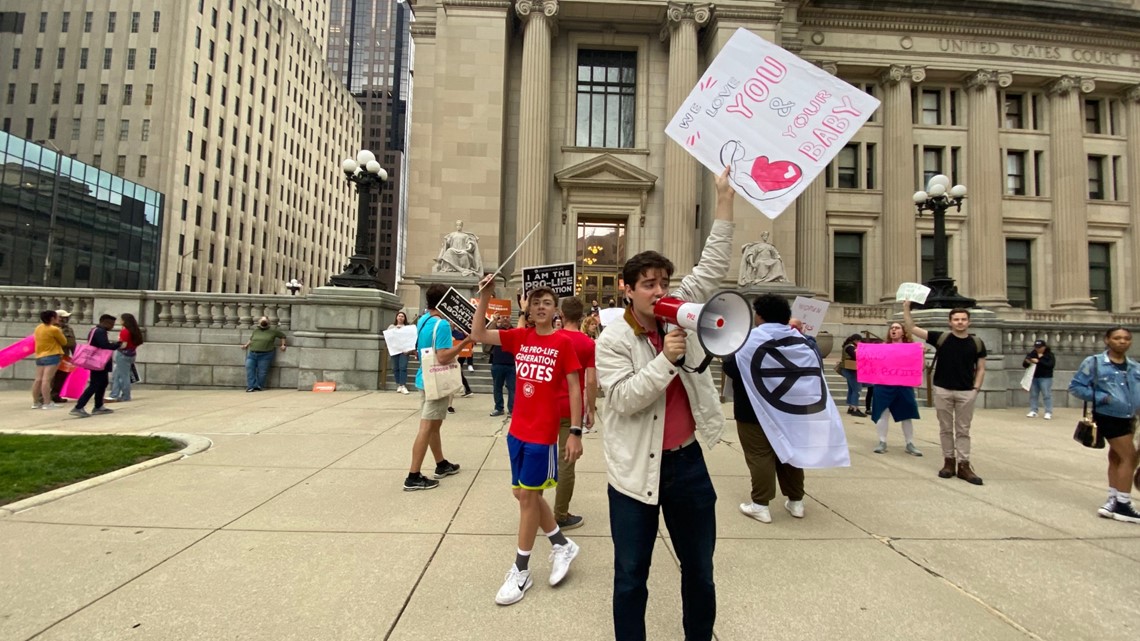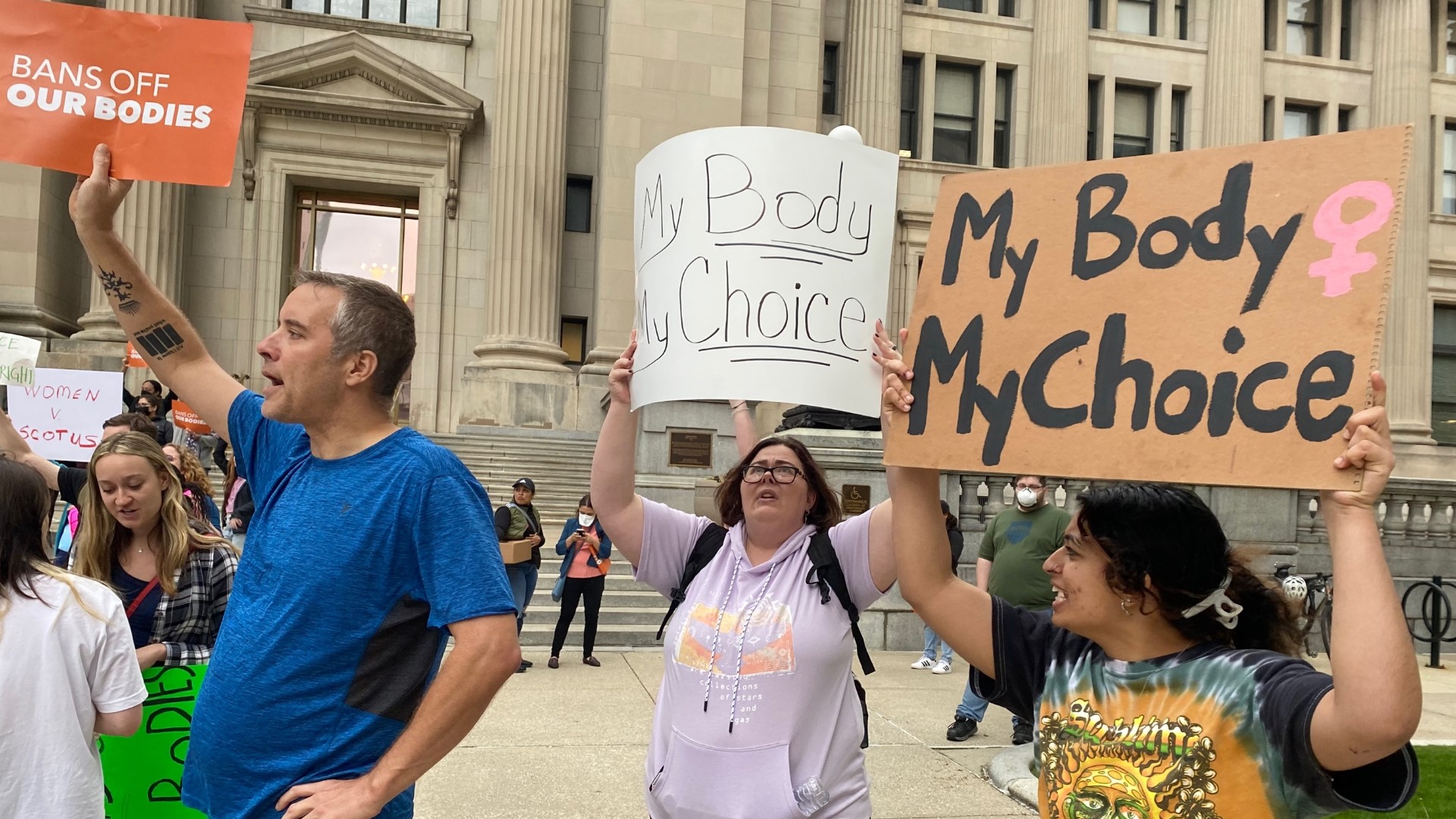INDIANAPOLIS — A draft opinion suggests the U.S. Supreme Court is poised to overturn the landmark 1973 Roe v. Wade case that legalized abortion nationwide, according to a report released by Politico on Monday night.
That opinion would make access to abortion a state-by-state issue because it is the court's response to the Dobbs vs. Jackson Women's Health Organization — a case surrounding Mississippi's 2018 Gestational Age Act, which bans essentially all abortions after 15 weeks.
"The Supreme Court looks set to overturn that, and overturn abortion as a fundamental right. Now, what that means is that, basically, it's going to go back to the states," said Dr. Jody Lyneé Madeira, who is a professor of law and Louis F. Niezer faculty fellow at the Indiana University Maurer School of Law.
Medical and legal experts contend Indiana legislators have already worked to restrict access to abortion more aggressively than other states, and say Hoosiers could expect an abortion ban if the Supreme Court moves through with the decision.
While Indiana does not have trigger ban laws in place, which would immediately prohibit abortions if Roe v. Wade is overturned like 13 other states, a glance at previously introduced state legislation suggests the state’s Republican supermajority would move fast to prohibit abortion within the legislature.
"Indiana has been one of the worst, in terms of going as far as possible, in terms of restricting abortion access. We have essentially every single targeted restriction of abortion provider law that exists here in Indiana," said Dr. Cailtin Bernard, who is an expert in sexual and reproductive health at IUPUI.
Those restrictions include measures meant to restrict abortion access that were enacted in the state between 2011 and 2019. Indiana was one of six states that moved — and failed — to pass a measure that would ban abortion for nearly all circumstances in 2011. Legislators introduced another abortion ban in 2018, but it failed as well.


In 2019, Indiana banned the dilation and evacuation (D&E) procedure which is the most common second-trimester abortion method. In 2021, women were required to undergo an ultrasound 18 hours ahead of an abortion.
More restrictions on abortion include, Bernard said, mandated counseling with "medically inaccurate information," waiting periods requiring women to have two separate visits before they can have their abortion, and forced ultrasounds "that are not always medically necessary."
"What we see in Indiana is that they have continued to erode those rights such that for many people, [abortion] is functionally inaccessible. If you live in a rural area, if you don't have access to a clinic anywhere near your house, if are low-income — particularly affecting Black and women of color — then you functionally have no access to abortion," Bernard said.
Insurance coverage for abortion can be a barrier to abortion access in the state.
"We see, particularly for women requiring abortion in the hospital setting, that they have essentially no access to abortion because they don't have any insurance coverage for it," Bernard said.
All of the abortion restrictions that have passed or been introduced in the state are moved, Madeira said, through the legislature as opposed to being established by court cases. However, an Indiana case nearly marked the first time a U.S. woman was charged with feticide. Purvi Patel was sentenced to 20 years in prison for allegedly attempting to use abortion medication she used over the internet.
Women's advocacy groups said the case marked the first time a state feticide law was used against a woman because of an alleged self-induced abortion. Her conviction was overturned by the Indiana Court of Appeals in July 2016.
Amid speculation the Republican supermajority would move to align with dozens of states who have made strides to restrict or ban abortion already, lawmakers have largely remained mum in the wake of the leaked draft opinion.
In March, 100 Republican legislators wrote a letter to Gov. Eric Holcomb, urging him to call a special session should the federal law be overturned.
Holcomb has not yet announced what his next moves are.
"Before further commenting on a leaked draft document out of the Supreme Court, like the rest of the country, I'll wait to review the official and final decision they release on the matter in the few weeks and months ahead," Holcomb said in a statement released by his office.
Twenty-six states are certain or likely to ban abortion if Roe v. Wade is overturned, according to the pro-abortion rights think tank, the Guttmacher Institute.
Of those, 22 states already have total or near-total bans on the books that are currently blocked by Roe, aside from Texas. The state's law banning it after six weeks has already been allowed to go into effect by the Supreme Court due to its unusual civil enforcement structure.
Four more states are considered likely to quickly pass bans if Roe is overturned, based on the political composition of those states and previous actions to limit access to abortion.
Abortions remain legal in Indiana.
“I think the most important thing for people to understand is that abortion is still legal and accessible here in Indiana, and should people need care, they absolutely can continue to access that care until a final decision is made," Bernard said.

